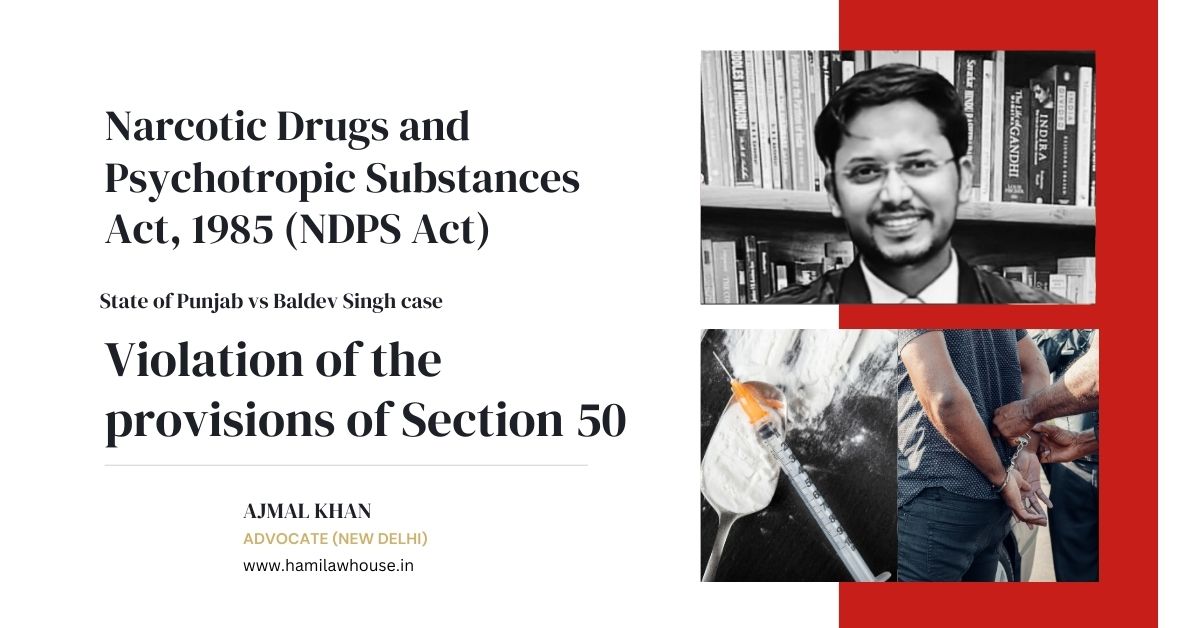New Delhi: Violation of the provisions of Section 50 of the Narcotic Drugs and Psychotropic Substances Act, 1985 (NDPS Act) refers to situations where the mandatory requirements outlined in Section 50 are not adhered to during a search or seizure conducted by law enforcement authorities in connection with narcotics offenses. Section 50 of the NDPS Act lays down specific procedures that must be followed during the search of a person, including the requirement to inform the person being searched of their right to be searched in the presence of a gazetted officer or magistrate.
If these procedures are not followed, it can be considered a violation of Section 50. In cases where evidence is collected during a search conducted in violation of Section 50, questions may arise regarding the admissibility of such evidence in court proceedings. The admissibility of evidence collected in violation of Section 50 has been a subject of legal debate and has led to differing opinions in various court judgments, as seen in the State of Punjab vs Baldev Singh case 1.
Therefore, a violation of the provisions of Section 50 of the NDPS Act can have implications for the legality of the search, seizure, and the admissibility of evidence in cases related to narcotics offenses.
The main issue addressed by the Supreme Court in the State of Punjab vs Baldev Singh case was the interpretation and application of Section 50 of the Narcotic Drugs and Psychotropic Substances Act, 1985 (NDPS Act) regarding the search and seizure of contraband substances. The Court examined the mandatory requirements of Section 50 and the implications of non-compliance with these provisions on the admissibility of evidence in criminal trials involving narcotics offenses (2).
How did the Court interpret the provisions of Section 50 of the NDPS Act in relation to search and seizure?
The Court interpreted the provisions of Section 50 of the NDPS Act in relation to search and seizure by establishing that if a police officer conducts a search or makes an arrest without prior information as required by the NDPS Act, and during such search or arrest, there is an incidental recovery of narcotics, then Section 50 would not be attracted at that stage. In such cases, the empowered officer should be informed, and if the same officer is empowered, they should proceed with the investigation in accordance with the NDPS Act (13).
What were the key precedents cited by the Court in reaching their decision in this case?
In reaching their decision in the State of Punjab vs Baldev Singh case, the Court cited the following key precedents:
- The Court referred to the case of State of Punjab v. Balbir Singh, where it was concluded that the provisions of Section 50 of the NDPS Act are not attracted if a search or arrest is made without prior information as required by the Act, and if contraband is incidentally recovered during the search (13).
- The Court also considered the provisions of the Code of Criminal Procedure, particularly Section 51, which states that the provisions of the Code of Criminal Procedure shall apply to warrants issued, arrests, searches, and seizures under the NDPS Act, insofar as they are not inconsistent with the provisions of the NDPS Act (11).
These precedents played a crucial role in shaping the Court’s interpretation of the NDPS Act and its application to search and seizure procedures in narcotics-related cases.
Download Judgment: Click Here
Read More: Click Here
Hami Law TV Click Here: Hami Law TV
